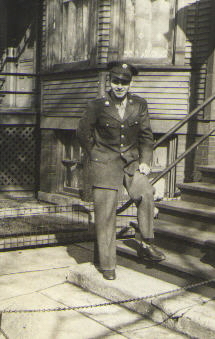When Margaret and Ray dated, I was twelve years old and in seventh grade, and when Ray would visit I would occasionally pester him for his ideas for composition topics. Ray always agreed to help me and he always had an enthusiastic way of making a dreary composition assignment into a challenging, fun project.
I do not remember details of the day Ray returned home from the War, but seeing Margaret sitting at the dining room table each night writing a letter to Ray is still vivid in my mind. Ray would also write letters to Margaret as often as he could from overseas.
It seemed both Margaret and I were always busy writing to Frank and Ray. We would use special stationery for letter writing during the War called V-Mail stationery which could be purchased at Woolworth's. The sheet of paper was thin and when folded, it conveniently became an envelope, too.
Mail was postage-free to servicemen and women during the War. Letters would be addressed with the serviceman's name and A.P.O. number (Army Post Office), and I believe his dog-tag number (the metal I.D. tag on a chain all servicemen wore around their necks) and we'd simply drop the V-Mail (the V was for Victory!) letter into the green mailbox and off it would go to loved ones wherever they were, in the States or overseas.
Like V-Mail, the war forced a number of changes in daily life here at home. During WWII, many people on the home front would grow their own vegetables in summer gardens to help U.S. farmers who would primarily ship most of their produce to troops in the States and overseas. This was a small part of the patriotism that existed during that time.
Collecting scrap metal and rubber and carrying these treasures in a red coaster wagon to our school playground for pickup by trucks was also a patriotic activity performed by school children on special free days from school - everything toward the War effort and so much patriotism.
Certain foods were rationed during the War and we civilians had to use special ration stamps to buy meat, cheese, coffee, sugar, shoes and gasoline - when available. These products were primarily being sent to our servicemen in the Army, Navy, Coast Guard, Marines and Air Force.
Margaret and the entire family were overjoyed when Uncle Ray returned home after the War, and not long after Ray returned, he and Aunt Margaret were remarried at a Catholic ceremony at St. Viator's Church in Chicago with a family gathering later at our home. St. Viator's was Uncle Ray's parish church.

1945 - Ray Chappatta on furlough, standing on stairs at 3341 N. Lakewood Avenue, Chicago [54B]